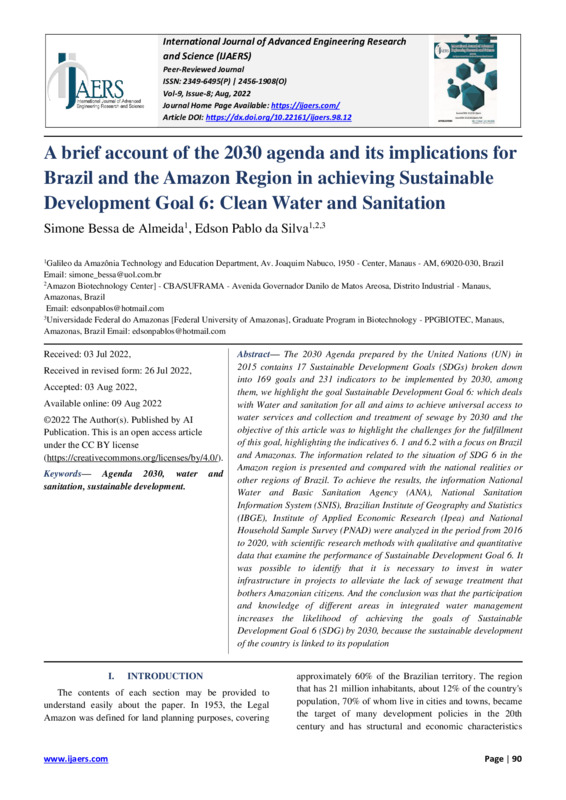A BRIEF ACCOUNT OF THE 2030 AGENDA AND ITS IMPLICATIONS FOR BRAZIL AND THE AMAZON REGION IN ACHIEVING SUSTAINABLE DEVELOPMENT GOAL 6: CLEAN WATER AND SANITATION
Item
-
Tipo do ITEM
-
Artigo Ciêntifico
-
Título do Artigo
-
A BRIEF ACCOUNT OF THE 2030 AGENDA AND ITS IMPLICATIONS FOR BRAZIL AND THE AMAZON REGION IN ACHIEVING SUSTAINABLE DEVELOPMENT GOAL 6: CLEAN WATER AND SANITATION
-
Descrição
-
The 2030 Agenda prepared by the United Nations (UN) in 2015 contains 17 Sustainable Development Goals (SDGs) broken down into 169 goals and 231 indicators to be implemented by 2030, among them, we highlight the goal Sustainable Development Goal 6: which deals with Water and sanitation for all and aims to achieve universal access to
water services and collection and treatment of sewage by 2030 and the objective of this article was to highlight the challenges for the fulfillment of this goal, highlighting the indicatives 6. 1 and 6.2 with a focus on Brazil and Amazonas. The information related to the situation of SDG 6 in the Amazon region is presented and compared with the national realities or other regions of Brazil. To achieve the results, the information National Water and Basic Sanitation Agency (ANA), National Sanitation Information System (SNIS), Brazilian Institute of Geography and Statistics (IBGE), Institute of Applied Economic Research (Ipea) and National Household Sample Survey (PNAD) were analyzed in the period from 2016 to 2020, with scientific research methods with qualitative and quantitative data that examine the performance of Sustainable Development Goal 6. It was possible to identify that it is necessary to invest in water infrastructure in projects to alleviate the lack of sewage treatment that bothers Amazonian citizens. And the conclusion was that the participation and knowledge of different areas in integrated water management increases the likelihood of achieving the goals of Sustainable Development Goal 6 (SDG) by 2030, because the sustainable development of the country is linked to its population.
-
Abstract
-
The 2030 Agenda prepared by the United Nations (UN) in 2015 contains 17 Sustainable Development Goals (SDGs) broken down into 169 goals and 231 indicators to be implemented by 2030, among them, we highlight the goal Sustainable Development Goal 6: which deals with Water and sanitation for all and aims to achieve universal access to
water services and collection and treatment of sewage by 2030 and the objective of this article was to highlight the challenges for the fulfillment of this goal, highlighting the indicatives 6. 1 and 6.2 with a focus on Brazil and Amazonas. The information related to the situation of SDG 6 in the Amazon region is presented and compared with the national realities or other regions of Brazil. To achieve the results, the information National Water and Basic Sanitation Agency (ANA), National Sanitation Information System (SNIS), Brazilian Institute of Geography and Statistics (IBGE), Institute of Applied Economic Research (Ipea) and National Household Sample Survey (PNAD) were analyzed in the period from 2016 to 2020, with scientific research methods with qualitative and quantitative data that examine the performance of Sustainable Development Goal 6. It was possible to identify that it is necessary to invest in water infrastructure in projects to alleviate the lack of sewage treatment that bothers Amazonian citizens. And the conclusion was that the participation and knowledge of different areas in integrated water management increases the likelihood of achieving the goals of Sustainable Development Goal 6 (SDG) by 2030, because the sustainable development of the country is linked to its population.
-
Língua do arquivo
-
inglês
-
Data da Publicação
-
Ano 2021
-
Palavra-chave
-
Agenda 2030
-
Water and sanitation
-
Sustainable development
-
Autores
-
Simone Bessa de Almeida
-
Edson Pablo da Silva
-
Local
-
ITEGAM - Manaus, 2022
-
Áreas de Conhecimento
-
Energia e Meio Ambiente
-
Turma
-
Turma 01


